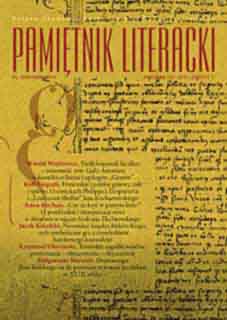Renesansowe teorie figuratywności: Peter Schade (Petrus Mosellanus)
Renaissance Theories of Figurativity: Peter Schade (Petrus Mosellanus)
Author(s): Wojciech RyczekSubject(s): Literary Texts
Published by: Instytut Badań Literackich Polskiej Akademii Nauk
Keywords: Peter Schade; Petrus Mosellanus; Peter Schade's "Tabulae de schematibus et tropis"; figurativity
Summary/Abstract: The main purpose of the paper is to present some logical and semantic assumptions hidden behind the theory of figurativity, elaborated by a German humanist and scholar Peter Schade (Petrus Mosellanus, 1493–1524) in the treatise entitled "Tabulae de schematibus et tropis" (Frankfurt 1516). The work, written with a thought of students, is a brief list of schemes and tropes known as the figures of speech or the rhetorical devices. The figurativity is considered in the manual as a sphere of connotations, allowing for various semantic transformations (described by the theoreticians in terms of rearrangement or substitution), what is especially evident in the case of tropes (four ‘master’ tropes: metaphor, metonymy, synecdoche, and irony). It also remains in a strict connection with the literal meaning, theoretically regarded as a domain of denotation. For the humanists, language is almost a universal instrument of human cognition, a useful tool of communication and persuasion, and a functional way of expressing thoughts, feelings, and emotions. Their confidence to words is based largely on the presumption of the existence of a natural correlation between two heterogeneous domains of reality: words (verba) and things (res). From grammatical point of view, every trope is a kind of aberration that infracts the criteria of linguistic correctness. The figurativity creates a challenge for a referential semantics, because it generates ambiguity, for instance by changing the established order or meaning of words. Grammatical and rhetorical analysis reveals that language does not refer to reality in direct way, but actively constitutes an unlimited world of meanings.
Journal: Pamiętnik Literacki. Czasopismo kwartalne poświęcone historii i krytyce literatury polskiej
- Issue Year: 2013
- Issue No: 3
- Page Range: 153-172
- Page Count: 20
- Language: Polish

